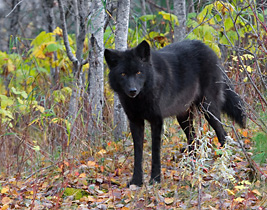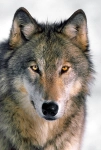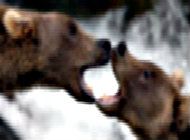This goes to the central issue that wolves are highly social, sentient beings. They aren’t just numbers. Counting wolves as if they’re inanimate objects, to achieve the lowest common denominator, of reducing the wolf population to negligible numbers, is not only wrong, it’s bad science. It doesn’t take a genius to understand that indiscriminately killing members of wolf families, in a sick game of annual Russian Roulette, causes wolves tremendous stress. Wolves have just a 1 in 10 hunt success rate, that means their lives are not easy, even under ideal conditions.
The cruelty of hunting, especially trapping and now legal wolf/dog fighting in Wisconsin, has turned their lives into a living hell. A wolf is a wolf is a wolf perpetuates the idea that wolves are interchangeable. That if hundreds of wolves lose their lives every year in the hunts, it’s OK because wolves will just make more wolves. There is no consideration of pack structure, hierarchy or the importance of alphas leading and teaching their young. What happens to the young wolves who lose their parents at five or six months of age? What chance do they have of surviving and becoming good hunters? I think we all know the answer to that but fish and game agencies don’t care about wolf society or their social interactions. They care about their customers, the hunters and maximizing ungulate numbers to make as much money on hunting tags as possible. If they have to slaughter wolves to achieve that goal, they could care less.
I’d like to see how brave these trophy hunters would be without their high-powered weaponry, baits, traps, snares, AR-15’s, et al. They wouldn’t last two seconds.
Harassed wolves show elevated levels of stress and reproductive hormones
View original post 351 more words








 Boulder White Clouds Council
Boulder White Clouds Council Exposing The Big Game
Exposing The Big Game Footloose Montana
Footloose Montana Friends of the Clearwater
Friends of the Clearwater Lockwood Animal Rescue Center
Lockwood Animal Rescue Center Louise du Toit
Louise du Toit LUPUSLAETUS
LUPUSLAETUS Mercy For Animals
Mercy For Animals Northern Idaho Wolf Alliance (NIWA)
Northern Idaho Wolf Alliance (NIWA) Predator Friendly®- Because Wildlife Matters
Predator Friendly®- Because Wildlife Matters Project Coyote
Project Coyote Project: Wolf
Project: Wolf The Nature Conservancy
The Nature Conservancy The Ravensong Group
The Ravensong Group WildEarth Guardians
WildEarth Guardians Wisconsin Wildlife Ethic-Vote Our Wildlife
Wisconsin Wildlife Ethic-Vote Our Wildlife Wolf And Wildlife Studies: Jay Mallonee (Independent Wolf Biologist)
Wolf And Wildlife Studies: Jay Mallonee (Independent Wolf Biologist) Wolf Song of Alaska
Wolf Song of Alaska Wolves in english ! Les loups en anglais !
Wolves in english ! Les loups en anglais ! WWP's Gray Wolf Page
WWP's Gray Wolf Page Yellowstone To Yukon Conservation Initiative
Yellowstone To Yukon Conservation Initiative